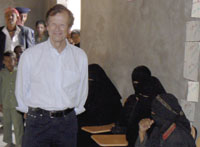
Yemeni men need to change their mentality [Archives:2007/1036/Last Page]
March 26 2007
 |
For Yemen Times
The self interest of the E.C. lay behind the funding of NGO run development schemes in Yemen, explained the E. C. Ambassador, Patrick Renauld Head of The European Commission Delegation to Jordan and Yemen, during in an interview with the Yemen Times on Thursday.
“We are funding development in Yemen because in the long run it will benefit the European Community”, he said, “we are not here for exercises in democratic reform”, an allusion to more ideological courses of action in the region by outside powers. He pointed out that Yemen's economic growth was in the E. C.'s interest because European consumers could then buy quality produce from Yemen.
On a broader scale, he commented that development was necessary in the Middle East and Africa, because it would alleviate the drift of the worlds poor and displaced towards Europe. He mentioned specifically Yemen's strategic importance in the Horn of Africa and the Middle East, and its potential influence for calm over its troubled neighbor Somalia.
The Ambassador made clear that when dealing with issues such as development and economic migration, it is only possible to consider change through long term projects that work alongside the natural development of a culture. This was why the E.C. is funding NGO's such as CARE: CARE has 30 projects in villages throughout Yemen, which aim at the empowerment of women in the community. The organisation provides chicken farms and the training to allow local women to run them at a profit, so that they can fund literacy and healthcare classes for female villagers. CARE also sets up practical examples in the villages of small-scale projects that will improve quality of life, such as vegetable gardens, and methods of extracting natural gas from manure to provide fuel. This is done with the aim of demonstrating a means for villagers to set up and sustain projects independently.
When the Yemen Times visited the village of Ayn, in the governorate of Mahweet, with the Ambassador, the success of the chicken farm and literacy classes were plain to see. The local women were clearly enthusiastic about the opportunity of gaining an education, and obviously the dynamic force in the success of the project. However, problems arose when development encroached upon the oppressive patriarchal culture of the village. Mohamed Saad, the programme director of CARE, quoted the findings of a study into the average working hours of village men and women, and commented on their implications:
“On average men will work between 4-6 hours a day, while the women will work up to 12. The women are responsible for arduous tasks like fetching water and firewood, which can take more than 4 hours a day. For development to be more wide-ranging and successful there must be greater involvement from men.”
The socially ingrained laziness of the men was evident in the failure of the worked examples of the vegetable garden, and of the manure gas producer, to be reproduced in the village. Both require an amount of heavy labour and modifications to produce long-term benefits: in the use of rain storage tanks for the garden, and in the digging of a hole for the gas. The only comment the local men made was that if they were given funds to dig a well they would not have to wait for rainwater (not a viable course of action in the region). There seemed to be very little incentive or organisation among the male labour force.
The Ambassador was in his own words “frustrated but not despairing” at the attitude of the male villagers, and returned to his earlier point: “For success with the men we must encourage, but also wait, for a change of mentality. For this to take effect we must think in terms of years not months.”
——
[archive-e:1036-v:14-y:2007-d:2007-03-26-p:lastpage]


